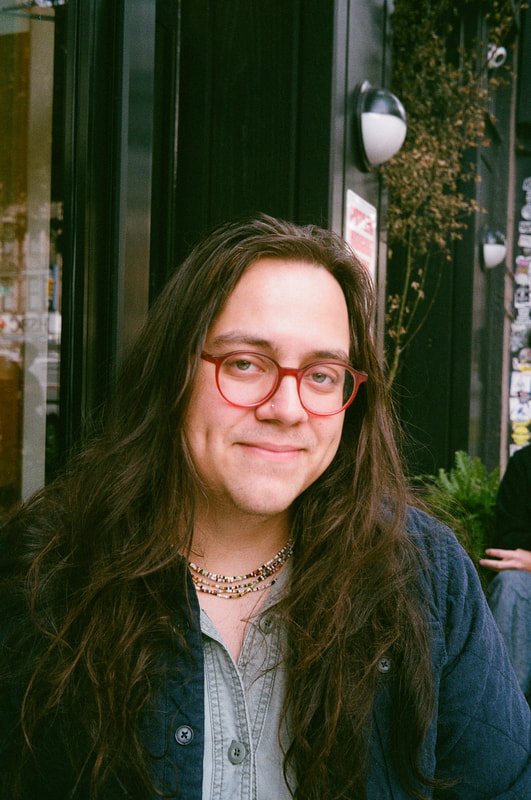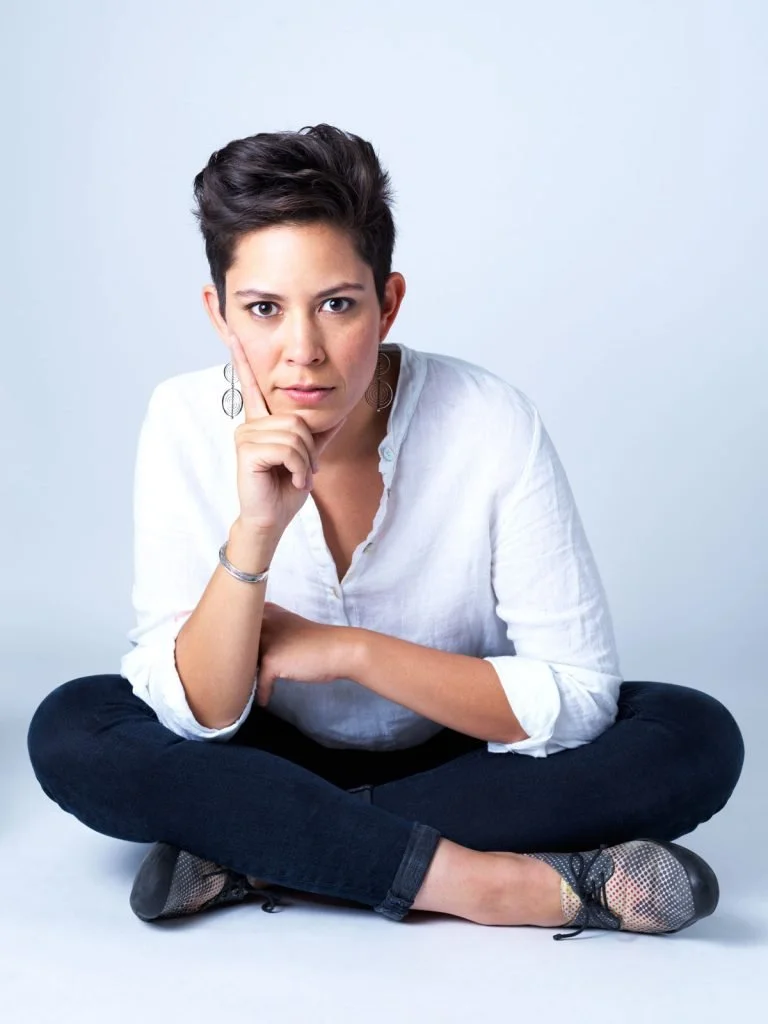
The ominous reverberations of Talowa’ Hiloha, the “thunder song” by Jerod Impechchaachaaha’ Tate, opens the season with a focus on the historically underrepresented voices of Indigenous composers. The evening also features the luminous Imago by Andean composer inti figgis-vizueta and Gabriela Ortiz’s Pico-Bite- Beat – an imaginative and intriguing musical exploration of Mesoamerican cuisine.
This concert is underwritten by Ben and Gigi Huberman
Program
| Jerod Impichchaachaaha’ Tate | Talowa’ Hiloha (Thunder Song) (1994) – 9’ |
| George Nickson, timpani |
| inti figgis-vizueta | Imago (2021) – 15’ |
| Samantha Bennett, Jennifer Best Takeda violins Alex D’Amico, viola Clare Monfredo, cello |
| Elizabeth Ogonek | Lightenings (2016) – 16’ |
| Samantha Bennett, violin Jesse Martins, piano Bharat Chandra, clarinet Marcelina Suchocka, percussion George Nickson, conductor |
| Michael Begay | Cloak of Autumn (2018) – 5’ |
| Samantha Bennett, Jennifer Best Takeda violins Alex D’Amico, viola Clare Monfredo, cello |
| Gabriela Ortiz | Pico-Bite-Beat (2018) 19’ |
| Samantha Bennett, Jennifer Best Takeda violins Alex D’Amico, viola Clare Monfredo, cello George Nickson, percussion |
Jerod Impichchaachaaha’ Tate
is a classical composer, citizen of the Chickasaw Nation in Oklahoma and is dedicated to the development of American Indian classical composition. His Washington Post review states that “Tate is rare as an American Indian composer of classical music. Rarer still is his ability to effectively infuse classical music with American Indian nationalism.”
Tate is Guest Composer/Conductor/Pianist for San Francisco Symphony Currents program Thunder Song: American Indian Musical Cultures and was recently Guest Composer for Metropolitan Museum of Art’s Balcony Bar program Home with ETHEL and Friends, featuring his commissioned work Pisachi (Reveal) for String Quartet.
Recent commissions include Shell Shaker: A Chickasaw Opera for Mount Holyoke Symphony Orchestra, Ghost of the White Deer, Concerto for Bassoon and Orchestra for Dallas Symphony Orchestra, Hózhó (Navajo Strong) and Ithánali (I Know) for White Snake Opera Company. His music was recently featured on the HBO series Westworld.
His commissioned works have been performed by the National Symphony Orchestra, San Francisco Symphony and Chorus, Dallas Symphony Orchestra, Detroit Symphony Orchestra, Minnesota Orchestra, Buffalo Philharmonic Orchestra, Oklahoma City Philharmonic, Winnipeg Symphony Orchestra, South Dakota Symphony Orchestra, Colorado Ballet, Canterbury Voices, Dale Warland Singers, Santa Fe Desert Chorale and Santa Fe Chamber Music Festival.
Tate has held Composer-in-Residence positions for Music Alive, a national residency program of the League of American Orchestras and New Music USA, the Joyce Foundation/American Composers Forum, Oklahoma City’s NewView Summer Academy, Oklahoma Medical Research Foundation and Grand Canyon Music Festival Native American Composer Apprentice Project. Tate was the founding composition instructor for the Chickasaw Summer Arts Academy and has taught composition to American Indian high school students in Minneapolis, the Hopi, Navajo and Lummi reservations and Native students in Toronto.
Mr. Tate is a three-time commissioned recipient from the American Composers Forum, a Chamber Music America’s Classical Commissioning Program recipient, a Cleveland Institute of Music Alumni Achievement Award recipient, a governor-appointed Creativity Ambassador for the State of Oklahoma and an Emmy Award winner for his work on the Oklahoma Educational Television Authority documentary, The Science of Composing.
In addition to his work based upon his Chickasaw culture, Tate has worked with the music and language of multiple tribes, such as: Choctaw, Navajo, Cherokee, Ojibway, Creek, Pechanga, Comanche, Lakota, Hopi, Tlingit, Lenape, Tongva, Shawnee, Caddo, Ute, Aleut, Shoshone, Cree, Paiute and Salish/Kootenai.
Among available recorded works are Iholba‘ (The Vision) for Solo Flute, Orchestra and Chorus and Tracing Mississippi, Concerto for Flute and Orchestra, recorded by the San Francisco Symphony Orchestra and Chorus, on the Grammy Award winning label Azica Records.
Tate earned his Bachelor of Music in Piano Performance from Northwestern University, where he studied with Dr. Donald Isaak, and his Master of Music in Piano Performance and Composition from The Cleveland Institute of Music, where he studied with Elizabeth Pastor and Dr. Donald Erb. He has performed as First Keyboard on the Broadway national tours of Les Misérables and Miss Saigon and been a guest pianist and accompanist for the Colorado Ballet, Hartford Ballet and numerous ballet and dance companies.
Mr. Tate’s middle name, Impichchaachaaha’, means “his high corncrib” and is his inherited traditional Chickasaw house name. A corncrib is a small hut used for the storage of corn and other vegetables. In traditional Chickasaw culture, the corncrib was built high off the ground on stilts to keep its contents safe from foraging animals.
Talowa’ Hiloha (Thunder Song)
The Chickasaw word for thunder and lightning is Heloha and, in history, Chickasaw people believed thunderstorms were the beloved, or holy people at war above the clouds. In an attempt to show their bravery and fearlessness of death, warriors would shoot their guns into the air during thunderstorms. This work is an homage to those old ways.
-Jerod Tate
inti figgis-vizueta
Called “wonderfully strange” (Pioneer Press) and “a cauldron of subtle sounds” (All About Jazz), the “smooth and serrated melodies” (The New York Times) of composer inti figgis-vizueta invite listeners into elemental sonic worlds that reveal “structure and simplicity within a cacophony of sound and complicated texture” (The Strad Magazine). She is the recipient of the Fred Ho Award from The ASCAP Foundation, the National Sawdust Hildegard Award, the American Composers Orchestra’s CoLABoratory Fellowship, and is the upcoming Dumbarton Oaks Early-Career Musician-in-Residence. inti enjoys weaving classical aesthetics and improvisational approaches into spontaneous, interactive works that highlight the transformative power of communal listening; The Washington Post says her music “feels sprouted between structures, liberated from certainty and wrought from a language we’d do well to learn”.
inti’s work has been commissioned and performed by leading American musicians and ensembles such as the Los Angeles Philharmonic, San Francisco Symphony, Oregon Symphony, Kronos Quartet, Attacca Quartet, JACK Quartet, Roomful of Teeth, Wild Up, Alarm Will Sound, Ensemble Dal Niente, Talea Ensemble, and Orchestra at St. Lukes, as well as European groups like Crash Ensemble, Ensemble Reflektor, James McVinnie’s Ensemble, and more. Recent highlights include the premiere of her cello concerto, Amaru, written for Jay Campbell and the LA Phil, conducted by Vimbayi Kaziboni; and a Carnegie Hall debut featuring the Kronos Quartet premiering her played-in-the-dark piece, music by yourself. inti wrote quiet city (& easter bells from the bowery) for violinist Jennifer Koh, featured her 2022 GRAMMY award-winning album Alone Together.
Upcoming projects include a new concerto for the GRAMMY award-winning Attacca Quartet and American Composers Orchestra, a new interdisciplinary work for vocal octet with the GRAMMY award-winning Roomful of Teeth and animator Rose Bond, and Haydn response projects for PODIUM Esslingen ft. Ensemble Reflektor and period instrument ensemble, The Cramer Quartet.
Committed to cultivating the next generation of free and creative musicmakers, inti regularly teaches with the Luna Composition Lab, founded and run by composers Missy Mazzoli & Ellen Reid, and Wildflower Composers Festival; both programs work to increase access and opportunities for young gender expansive and women composers. inti speaks regularly on her music with recent seminar presentations at NYU, McGill, UCSD, Duke, and the LA Phil Composer Fellowship program and regular coaches her music with emerging artist programs like Carnegie Hall’s Ensemble Connect, the Civic Orchestra of Chicago, Music Academy of the West, and Nief Norf Summer Festival. inti has participated in fellowships and residencies with the Civitella Ranieri Foundation, MASS MoCA, Copland House, Center for Ballet & the Arts/National Sawdust, Avaloch Farm Music Institute, Lawrence University, Pocantico Center, LA Philharmonic National Composers Intensive, Sō Percussion Studio, and Virginia Tech. Her music has been featured at festivals such as TIME:SPANS, Ojai, Caramoor, Aspen, Spoleto, New Music Dublin, PODIUM Esslingen, and many more.
inti studied with Marcos Balter, Felipe Lara, George Lewis, and Donnacha Dennehy. She received mentorship from Angélica Negrón, Andrew Norman, Tania León, Amy Beth Kirsten, Anthony Cheung, Du Yun, and Gavilán Rayna Russom.
inti loves reading poetry, particularly Danez Smith and Joy Harjo. inti honors her Quechua bisabuela, who was the only woman butcher on the whole plaza central and used to fight men with a machete. inti is committed to creating and supporting trans and Indigenous futures through her work and advocacy.
Imago
Imago is a response to artworks that, due to the pandemic, I couldn’t see or interact with in real life. The distance from the pieces and the wonderful Attacca Quartet created something of a disembodied writing experience. Untitled & The Allusion of Gravity exist most clearly in my mind, illuminated and filled in by imagination & impression. However, I can’t draw on the memories or emotions of first sight, deep study, or sketching in their presence. What did translate over the internet and staring my eyes red at the laptop screen, was the musicality and impossible figurations of Linn Meyers’ and Alyson Shotz’s incredible works. Their limited materials, repetition, and sheer physicality of process made me determined to bring those presences into this new work and seek proximities.
Repetition, for me, is queer — pushing to see a single moment from every angle, the desire to experience multiplicity, recognizing the capacity of objects to move in a thousand directions at once. I wrote to invoke images of physical creation with timbre, process, and shared materials. I strove to interact the motion of drawing with the smooth movement of a quartet of bows, of adding detail with pen or brush as dragging tightened hair. I saw the physicality and endurance of continuous motion, bowing or harmonics or strums or dense harmonies, as the bending and beading of a complex work. I sought the infinite shapes and implications of a group orientation towards sculpture or magnified square of mylar - in their overlapping vision, a new and beautiful object. A wider perspective.
(Imago is the final stage of insects metamorphosis- happy cicada year)
- inti figgis-vizueta
Elizabeth Ogonek
whose music has been described as “shimmering,” “dramatic” and “painstakingly crafted” by the Chicago Tribune, is an American composer living and working in New York.
In 2015, Ogonek was appointed to the Chicago Symphony Orchestra as the Mead Composer-in-Residence, a position which she held alongside Samuel Adams until 2018. During her tenure with the CSO, she was commissioned to write three new works: In Silence (after Biber), a chamber violin concerto featuring violinist Benjamin Beilman, which was premiered under the direction of Elim Chan; an orchestral work entitled All These Lighted Things, conducted by Riccardo Muti and later featured on the orchestra’s 2017 west coast tour; and The Water Cantos, a work for twelve players commissioned in celebration of the 20th anniversary season of MusicNOW and premiered under Esa-Pekka Salonen. She was also responsible for co-curating MusicNOW, the orchestra’s new music series, which brought together CSO musicians with composers to explore the music of today as well as influential works of the 20th century.
Ogonek has also worked closely with the London Symphony Orchestra for whom she has written two orchestral works: as though birds and Sleep & Unremembrance. Both pieces were premiered under the direction of François-Xavier Roth at the Barbican Centre. In early 2020, the LSO gave the European premiere of All These Lighted Things while the Toronto Symphony Orchestra gave the Canadian premiere of as though birds. Other orchestras that have performed her music include the Royal Philharmonic Orchestra, the Civic Orchestra of Chicago, the American Composers’ Orchestra and the Music Academy of the West’s Academy Festival Orchestra.
Recent notable chamber and solo projects include two works for the Santa Fe Chamber Music Festival, a work for Ensemble 360, a solo piano work, Orpheus Suite, commissioned by the Music Academy of the West and a Fromm Foundation commissioned work, where are we now, for pianist Xak Bjerken, percussion quartet and male vocal sextet on a text by Paul Griffiths.
Upcoming projects for the 2021-22 season include a new chamber work for the 75th anniversary season of the Chamber Music Conference and Composers’ Forum of the East and a new orchestral work that has been co-commissioned by the BBC Proms and the Los Angeles Philharmonic.
In the summer of 2018, Ogonek was in residence at the Music Academy of the West in Santa Barbara, California. Her music was also featured in the 2018 BBC Proms in a collaboration with Gerard McBurney. In early 2020, Ogonek was in residence with the FLUX Quartet at Kanagawa Kenmin Hall in Yokohama, Japan for performances of her string quartet Running at Still Life.
Ogonek’s work has been recognized by the ASCAP Foundation, the Royal Philharmonic Society, the Ohio Arts Council and the American Academy of Arts and Letters.
Born in 1989, Ogonek grew up in New York City. Her primary teachers included Don Freund, Claude Baker, Michael Gandolfi, Donald Crockett, Stephen Hartke and Julian Anderson. A former Beinecke and Marshall Scholar, she holds degrees from Indiana University, Jacobs School of Music (BM, 2009), the University of Southern California, Thornton School of Music (MM, 2012) and the Guildhall School of Music and Drama (DMus, 2017). She is currently an Assistant Professor of Composition at Oberlin Conservatory where she has taught since 2015. In 2021, she will begin an appointment as Assistant Professor of Composition at Cornell University.
Michael Begay
A Diné performer/composer of Chamber Music, Experimental Sound, Native American Flute, and Metal music, Michael Begay is a guitarist and bassist, but also plays piano, and various instruments both Native American and orchestral.
A graduate of the Grand Canyon Music Festival’s Native American Composer’s Apprentice Project (NACAP); Mr. Begay has studied under both Native and nonnative American Composers: Brent Michael Davids (Mohican), David Mallamud, Jerod Impichchaachaaha’ Tate (Chickasaw), Libby Larson, and Raven Chacon (Diné).
Originally based on the Navajo Nation in Northern Arizona, Michael moved to Baltimore, Maryland, after being accepted to The Johns Hopkins Peabody Institute of Music, to further his studies in music composition. Currently, Michael Begay is studying music composition in the studio of Oscar Bettison at Peabody and is currently working on various compositions ranging from Chamber Music, Electronic Ensemble, Solo and Orchestral works.
Cloak of Autumn
This string quartet is my first experimental piece to date, some aspects of the piece were in development for over a year. This string quartet is an interpretation of the shift from fall to winter, the listener can then listen for the different textures that represent those changes.
- Michael Begay
Gabriela Ortiz
Latin Grammy nominated Gabriela Ortiz is one of the foremost composers in Mexico today, and one of the most vibrant musicians emerging in the international scene. Her musical language achieves an extraordinary and expressive synthesis of tradition and the avant-garde; combining high art, folk music and jazz in novel, frequently refined and always personal ways. Her compositions are credited for being both entertaining and immediate as well as profound and sophisticated; she achieves a balance between highly organized structure and improvisatory spontaneity.
Gustavo Dudamel, the conductor of the Los Angeles Philharmonic, called her recent work Téenek “one of the most brilliant I have ever directed. Its color, its texture, the harmony and the rhythm that it contains are all something unique. Gabriela possesses a particular capacity to showcase our Latin identity.”
Ortiz has written music for dance, theater and cinema, and has actively collaborated with poets, playwrights, and historians. Indeed, her creative process focuses on the connections between gender issues, social justice, environmental concerns and the burden of racism, as well as the phenomenon of multiculturality caused by globalization, technological development, and mass migrations. She has composed three operas, in all of which interdisciplinary collaboration has been a vital experience. Notably, these operas are framed by political contexts of great complexity, such as the drug war in Only the Truth, illegal migration between Mexico and the United States in Ana and her Shadow, and the violation of university autonomy during the student movement of 1968 in Firefly.
Although based in Mexico, her music is commissioned and performed all over the world. Her music has been commissioned and played by prestigious ensembles, soloists and orchestras such as Los Angeles Philharmonic, New York Philharmonic, The National Orchestra of Bretagne, The Cincinnati Symphony Orchestra, Gustavo Dudamel and Esa Pekka Salonen, Louis Langrée, Paolo Bartolameolli, Maria Dueñas, Zoltan Kocsis, Carlos Miguel Prieto, Kroumata and Amadinda Percussion Ensembles, Kronos Quartet, Dawn Upshaw, Sarah Leonard, Steve Schick, Cuarteto Latinoamericano, Pierre Amoyal, Southwest Chamber Music, Tambuco Percussion Quartet, The Hungarian Philharmonic Orchestra, The Malmo Symphony Orchestra, Simon Bolivar Orchestra, Royal Scottish National Orchestra, BBC Scottish Symphony, The Royal Liverpool Philharmonic among others. Recent premieres include: Kauyumari, Yanga and Téenek commissioned by the Los Angeles Philharmonic and Gustavo Dudamel, Fractalis for piano and orchestra dedicated to Simon Ghraichy and commissioned by the National Orchestra of Brtegne, Luciérnaga (her third opera) commissioned and produced by the National University of Mexico, Únicamente la Verdad (her first opera) with Long Beach Opera and Opera de Bellas Artes in Mexico among others.
Upcoming world premieres in 2022 include: Clara for orchestra commissioned by the New York Philharmonic, Altar de Cuerda for violin and orchestra commissioned by The Los Angeles Philharmonic and dedicated to María Dueñas, and Tzam for orchestra commissioned by Cincinnati Symphony Orchestra.
Ortiz has been honored with the National Prize for Arts and Literature, (the most important award for writers and artists given by the government of Mexico), The Mexican Academy of Arts, The Bellagio Center Residency Program, Civitella Ranieri Artistic Residency; John Simon Guggenheim Memorial Foundation Fellowship; the Fulbright Fellowship; the First prize of the Silvestre Revueltas National Chamber Music Competition, the First Prize at the Alicia Urreta Composition Competition; Banff Center for the Arts Residency; the Inroads Commission, a program of Arts International with funds from the Ford Foundation; the Rockefeller Foundation and the Mozart Medal Award.
In 2022 Ortiz has been appointed curator of the Pan-American Music Initiative along with The Los Angeles Philharmonic and Gustavo Dudamel.
Born in Mexico City her parents were musicians in the famous folk music ensemble Los Folkloristas founded in 1966 to preserve and record the traditional music of Mexico and Latin America. She trained with the eminent composer Mario Lavista at the National Conservatory of Music and Federico Ibarra at the National University of Mexico. In 1990 she was awarded the British Council Fellowship to study in London with Robert Saxton at The Guildhall School of Music and Drama. In 1992 she received the University of Mexico Scholarship to complete Ph.D. studies in electroacoustic music composition with Simon Emmerson at The City University in London.
She currently teaches composition at the Mexican University of Mexico City. Her music has been published by Saxiana Presto and Tre Fontane. From 2022 her music is published exclusively by Boosey & Hawkes.
Pico Bite-Beat
Countless times I have taken upon myself the task of reflecting on the similarities that exist between an artist and a chef. I profess a special admiration for all those who dedicate their lives to transforming food into poetry, a new experience for the body and inner spirit. Chefs and composers alike find their own way to compose diverse materials, mixing and blending them together with the objective of creating a unique flavor, a language all their own. The excitement and strategies of their work combine in a back-and-forth internal dialog, in an endless search for what is essentially and profoundly human.
Pico-Bite–Beat is where I explored for the first time the idea of working with sound metaphors through food and music. For this purpose, I took the city of Los Angeles as my starting point, due to the fact that its particular gastronomy unites a fascinating, sui generis universe of culinary tasks where the notions of borders are diluted in the midst of a great multiculturality, the product of globalization and mass migration. I was particularly interested in exploring the development and impact of Mexican food within a foreign context, in this case California.
During the process to find an efficient and emotional line of work given this new challenge, several questions emerged. How has the cuisine of our ancestors been reinterpreted? How have migrations from other cultures influenced Mexican gastronomy? What have been the most outstanding factors in the development of Mexican-American cooking?
In my search, I found that the Korean community in Los Angeles eats tacos and quesadillas, only they add kimchi, a pickled garnish composed of cabbage, ginger, spring onion, garlic, and radish. The world-famous “burritos” are no exception, because in addition to traditional ingredients, they may very well be filled with pastrami. Myriad so-called food trucks offer increasingly sophisticated innovations which doubtless reaffirm a kind of street appropriation through a means of culinary democratization and multiculturalization. I also came across pre-Hispanic food and the nostalgia for a lost collectivity, a search to reaffirm our identity within a context where industrialization and mass production have given rise to salsa preserves or canned chili peppers, as well as a million little bags of tortillas artificially seasoned with corn syrup and monosodium glutamate.
Starting from this gastronomic reconfiguration, Pico-Bite-Beat explores sonorous symbolisms that break away from these conventional acoustic borders in order to give rise to a new way of understanding the world that is far more intermingled and musically globalized. The piece is divided into five movements: 1-“Pico Street,” 2-“Sopa de Piedra,” 3-“Kimchi-Quesadilla,” 4-“Burrito Pastrami-Mariscos Jalisco,” and 5-“Guerrilla Tacos.”
Both “Pico Street” and “Guerrilla Tacos” allude to urban issues, those streets filled with small local restaurants, or even those famous aforementioned food trucks.
In “Sopa de Piedra,” or Stone Soup, we are immersed in the sounds of rituals and kitchen recipes in the Ajüuk tongue, through recordings from Tlahutiltepec, Oaxaca, together with the imaginary sounds of ancestral cooking.
In “Burrito Pastrami-Mariscos Jalisco” we hear on the one hand the rhythmic platforms of the sounds originating from industrial cooking and on the other, ambient noise from the famous “Mariscos Jalisco” (Jalisco Seafood) food truck. Finally, “Kimchi Quesadilla” takes us into the sound world of an imaginary culture located somewhere between Mexico and Korea.
Pico-Bite-Beat is dedicated to the renowned food critic Jonathan Gold, who with great sensitivity, respect, and admiration spoke of these small local food restaurants located nowhere other than Pico Street, redefining thus the perception of Los Angeles gastronomy. It was Gold who, under a new vision without prejudice, which was free, more fair, and equitable, wrote for the first time about the invaluable contribution of all these small locales, no matter how modest, where the migrant communities themselves have taken on a fundamental role.
My deepest thanks to Jorge Verdin for his valuable collaboration in the sound design and rhythmic tracks for the movements “Sopa de Piedra” and “Burrito Pastrami-Mariscos Jalisco.” I am also grateful to the information provided by Rodrigo Llanes Castro, a renowned Mexican chef and historian, regarding the gastronomy of our ancestors. Lastly, I would like to thank my brother, Rubén Ortiz-Torres, given that it was he who introduced me for the first time to the work of Jonathan Gold.
— Gabriela Ortiz







